Azure Automation Utilities¶
Table of Contents¶
Release Notes¶
Version |
Date |
Notes |
|---|---|---|
1.0.0 |
11/2023 |
Initial Release |
Overview¶
IBM SOAR App for Azure Automation

This app allows interaction with the following Azure Automation resources:
Automation Accounts
Activities
Jobs
Runbooks
Nodes
Credentials
Schedules
Modules
Agent Registration
Statistics
Key Features¶
Automation Accounts
Activities
Jobs
Runbooks
Nodes
Credentials
Schedules
Modules
Agent Registration
Statistics
Requirements¶
This app supports the IBM Security QRadar SOAR Platform and the IBM Security QRadar SOAR for IBM Cloud Pak for Security.
SOAR platform¶
The SOAR platform supports two app deployment mechanisms, Edge Gateway (also known as App Host) and integration server.
If deploying to a SOAR platform with an App Host, the requirements are:
SOAR platform >=
48.0.0.The app is in a container-based format (available from the AppExchange as a
zipfile).
If deploying to a SOAR platform with an integration server, the requirements are:
SOAR platform >=
48.0.0.The app is in the older integration format (available from the AppExchange as a
zipfile which contains atar.gzfile).Integration server is running
resilient-circuits>=48.0.0.If using an API key account, make sure the account provides the following minimum permissions:
Name
Permissions
Org Data
Read
Function
Read
Layout
Edit, Read
The following SOAR platform guides provide additional information:
Edge Gateway Deployment Guide or App Host Deployment Guide: provides installation, configuration, and troubleshooting information, including proxy server settings.
Integration Server Guide: provides installation, configuration, and troubleshooting information, including proxy server settings.
System Administrator Guide: provides the procedure to install, configure and deploy apps.
The above guides are available on the IBM Documentation website at ibm.biz/soar-docs. On this web page, select your SOAR platform version. On the follow-on page, you can find the Edge Gateway Deployment Guide, App Host Deployment Guide, or Integration Server Guide by expanding Apps in the Table of Contents pane. The System Administrator Guide is available by expanding System Administrator.
Cloud Pak for Security¶
If you are deploying to IBM Cloud Pak for Security, the requirements are:
IBM Cloud Pak for Security >=
1.10.15.Cloud Pak is configured with an Edge Gateway.
The app is in a container-based format (available from the AppExchange as a
zipfile).
The following Cloud Pak guides provide additional information:
Edge Gateway Deployment Guide or App Host Deployment Guide: provides installation, configuration, and troubleshooting information, including proxy server settings. From the Table of Contents, select Case Management and Orchestration & Automation > Orchestration and Automation Apps.
System Administrator Guide: provides information to install, configure, and deploy apps. From the IBM Cloud Pak for Security IBM Documentation table of contents, select Case Management and Orchestration & Automation > System administrator.
These guides are available on the IBM Documentation website at ibm.biz/cp4s-docs. From this web page, select your IBM Cloud Pak for Security version. From the version-specific IBM Documentation page, select Case Management and Orchestration & Automation.
Proxy Server¶
The app does support a proxy server.
Python Environment¶
Python 3.6 and Python 3.9 are supported. Additional package dependencies may exist for each of these packages:
resilient-circuits>=48.0.0
Installation¶
Install¶
To install or uninstall an App or Integration on the SOAR platform, see the documentation at ibm.biz/soar-docs.
To install or uninstall an App on IBM Cloud Pak for Security, see the documentation at ibm.biz/cp4s-docs and follow the instructions above to navigate to Orchestration and Automation.
App Configuration¶
The following table provides the settings you need to configure the app. These settings are made in the app.config file. See the documentation discussed in the Requirements section for the procedure.
Config |
Required |
Example |
Description |
|---|---|---|---|
auth_url |
Yes |
|
The auth_url setting is used to get a new refresh token. |
client_id |
Yes |
|
Azure AD Application client ID |
client_secret |
Yes |
|
Azure AD Application client secret |
refresh_token |
Yes |
`` |
The refresh token used to obtain a new access token (for refresh token grant) |
scope |
Yes |
|
Scopes are a way to limit the amount of access that is granted to an access token. |
subscription_id |
Yes |
|
Azure subscription ID |
tenant_id |
Yes |
|
Azure AD Application tenant ID |
token_url |
Yes |
|
The token_url setting is used to get a new access token. |
https_proxy |
No |
|
Proxy url and port |
Custom Layouts¶
Import the Data Tables and Custom Fields like the screenshot below:

Function - Azure Create Account¶
Create or update an automation account on Azure
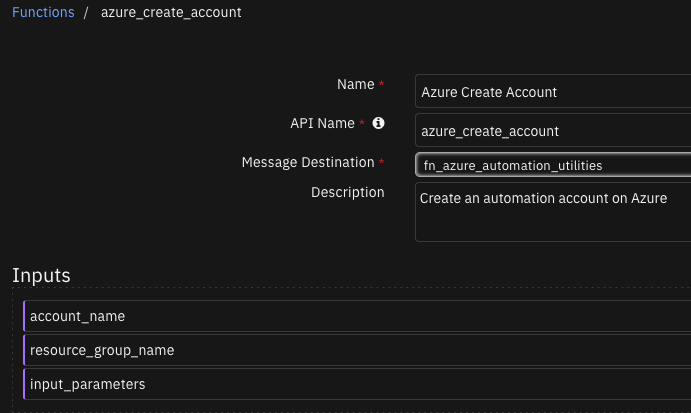
Inputs:
Name |
Type |
Required |
Example |
Tooltip |
|---|---|---|---|---|
|
|
No |
|
Azure Automation Account Name |
|
|
No |
|
True if you are updating an account |
|
|
No |
|
string with dictionary format |
|
|
No |
|
Existing Azure automation resource group name |
Outputs:
NOTE: This example might be in JSON format, but
resultsis a Python Dictionary on the SOAR platform.
results = {
"content": {
"etag": null,
"id": "/subscriptions/abcdefgh-1234-abcd-1234-a1b2c3d4e5f6/resourceGroups/demoassets/providers/Microsoft.Automation/automationAccounts/autotester24",
"location": "Canada East",
"name": "autotester24",
"properties": {
"RegistrationUrl": "https://55555555-3333-4444-bb0f-030397ea7fc1.agentsvc.yq.azure-automation.net/accounts/55555555-3333-4444-bb0f-030397ea7fc1",
"RuntimeConfiguration": {
"powershell": {
"builtinModules": {
"Az": "8.0.0"
}
},
"powershell7": {
"builtinModules": {
"Az": "8.0.0"
}
}
},
"automationHybridServiceUrl": "https://55555555-3333-4444-bb0f-030397ea7fc1.jrds.yq.azure-automation.net/automationAccounts/55555555-3333-4444-bb0f-030397ea7fc1",
"creationTime": "2023-08-22T12:44:27.9+00:00",
"disableLocalAuth": false,
"encryption": {
"identity": {
"userAssignedIdentity": null
},
"keySource": "Microsoft.Automation"
},
"lastModifiedBy": null,
"lastModifiedTime": "2023-08-22T12:44:27.9+00:00",
"publicNetworkAccess": true,
"sku": {
"capacity": null,
"family": null,
"name": "Basic"
},
"state": "Ok"
},
"systemData": {
"createdAt": "2023-08-22T12:44:27.9+00:00",
"lastModifiedAt": "2023-08-22T12:44:27.9+00:00"
},
"tags": {},
"type": "Microsoft.Automation/AutomationAccounts"
},
"inputs": {
"account_name": "autotester24",
"input_parameters": "{\u0027name\u0027: \u0027autotester24\u0027, \u0027location\u0027: \u0027Canada East\u0027, \u0027tags\u0027: None, \u0027properties\u0027: {\u0027publicNetworkAccess\u0027: True, \u0027disableLocalAuth\u0027: False, \u0027sku\u0027: {\u0027name\u0027: \u0027Basic\u0027}}}",
"resource_group_name": "demoassets"
},
"metrics": {
"execution_time_ms": 4988,
"host": "local",
"package": "fn-azure-automation-utilities",
"package_version": "1.0.0",
"timestamp": "2023-08-22 08:44:29",
"version": "1.0"
},
"raw": null,
"reason": null,
"success": true,
"version": 2.0
}
Example Function Input Script:
inputs.account_name = playbook.inputs.azure_automation_account_name
inputs.resource_group_name = playbook.inputs.azure_automation_resource_group
public_network_access = getattr(playbook.inputs, "azure_automation_account_public_network_access", True)
disable_local_auth = getattr(playbook.inputs, "azure_automation_account_disable_local_auth", False)
payload = {
"name": playbook.inputs.azure_automation_account_name,
"location": playbook.inputs.azure_automation_account_location,
"properties": {
"publicNetworkAccess": True if public_network_access == None else public_network_access,
"disableLocalAuth": False if disable_local_auth == None else disable_local_auth,
"sku":{
"name": "Basic"
}
}
}
if getattr(playbook.inputs, "azure_automation_account_tags", None):
payload["tags"] = getattr(playbook.inputs, "azure_automation_account_tags", {})
inputs.input_parameters = str(payload)
Example Function Post Process Script:
from datetime import datetime
results = playbook.functions.results.account_results
public_network_access = getattr(playbook.inputs, "azure_automation_account_public_network_access", True)
disable_local_auth = getattr(playbook.inputs, "azure_automation_account_disable_local_auth", False)
if results.get("success"):
incident.properties.azure_automation_create_ui_tab = True
content = results.get("content", {})
account_id = content.get("id", "")
resourceGroup_start = account_id.find("resourceGroups/")+15
resource_group = account_id[resourceGroup_start:account_id.find("/providers", resourceGroup_start)]
row = incident.addRow("azure_automation_accounts")
row["account_name_accounts"] = content.get("name", "")
row["resource_group_accounts"] = resource_group
row["location_accounts"] = content.get("location", "")
row["tags_accounts"] = str(content.get("tags"))
row["publicnetworkaccess_accounts"] = content.get("properties", {}).get("publicNetworkAccess", None)
row["disablelocalauth_accounts"] = content.get("properties", {}).get("disableLocalAuth", None)
row["account_deleted_accounts"] = False
row["account_query_date"] = int(datetime.now().timestamp()*1000)
Function - Azure Create Credential¶
Create or update a credential.
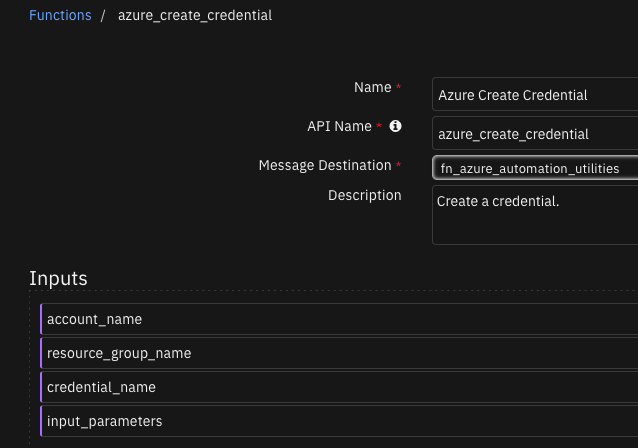
Inputs:
Name |
Type |
Required |
Example |
Tooltip |
|---|---|---|---|---|
|
|
No |
|
Azure Automation Account Name |
|
|
No |
|
Name of the Azure automation credential |
|
|
No |
|
If True will update the given credential. If False will create the given credential |
|
|
No |
|
string with dictionary format |
|
|
No |
|
Existing Azure automation resource group name |
Outputs:
NOTE: This example might be in JSON format, but
resultsis a Python Dictionary on the SOAR platform.
results = {
"content": {
"id": "/subscriptions/abcdefgh-1234-abcd-1234-a1b2c3d4e5f6/resourceGroups/demoassets/providers/Microsoft.Automation/automationAccounts/automation1/credentials/tes43",
"name": "tes43",
"properties": {
"creationTime": "2023-08-21T18:14:38.87+00:00",
"description": null,
"lastModifiedTime": "2023-08-21T18:14:38.87+00:00",
"userName": "tes43"
},
"type": "Microsoft.Automation/AutomationAccounts/Credentials"
},
"inputs": {
"account_name": "automation1",
"credential_name": "tes43",
"input_parameters": "{\u0027name\u0027: \u0027tes43\u0027, \u0027properties\u0027: {\u0027userName\u0027: \u0027tes43\u0027, \u0027password\u0027: \u0027password\u0027}}",
"resource_group_name": "demoassets"
},
"metrics": {
"execution_time_ms": 1506,
"host": "local",
"package": "fn-azure-automation-utilities",
"package_version": "1.0.0",
"timestamp": "2023-08-21 14:14:38",
"version": "1.0"
},
"raw": null,
"reason": null,
"success": true,
"version": 2.0
}
Example Function Input Script:
inputs.account_name = playbook.inputs.azure_automation_account_name
inputs.resource_group_name = playbook.inputs.azure_automation_resource_group
inputs.credential_name = playbook.inputs.azure_automation_credential_name
payload = {
"name": playbook.inputs.azure_automation_credential_name,
"properties": {
"userName": playbook.inputs.azure_automation_credential_username,
"password": playbook.inputs.azure_automation_credential_password
}
}
if getattr(playbook.inputs, "azure_automation_credential_description", None):
payload["properties"]["description"] = getattr(playbook.inputs, "azure_automation_credential_description", None)
inputs.input_parameters = str(payload)
Example Function Post Process Script:
from datetime import datetime
results = playbook.functions.results.create_results
if results.get("success"):
incident.properties.azure_automation_create_ui_tab = True
# Add information to the data table
row = incident.addRow("azure_automation_credentials")
row["credential_name"] = playbook.inputs.azure_automation_credential_name
row["credential_username"] = playbook.inputs.azure_automation_credential_username
row["credential_description"] = getattr(playbook.inputs, 'azure_automation_credential_description', None)
row["account_name_credentials"] = playbook.inputs.azure_automation_account_name
row["resource_group_credentials"] = playbook.inputs.azure_automation_resource_group
row["credential_deleted"] = False
row["credential_query_date"] = int(datetime.now().timestamp()*1000)
Function - Azure Create Schedule¶
Create or update a schedule.
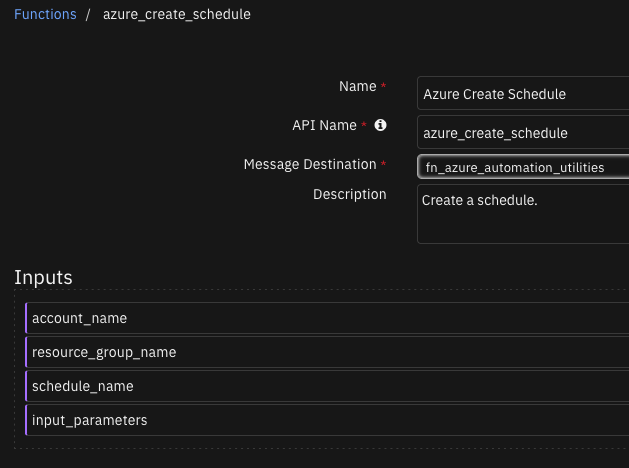
Inputs:
Name |
Type |
Required |
Example |
Tooltip |
|---|---|---|---|---|
|
|
No |
|
Azure Automation Account Name |
|
|
No |
|
string with dictionary format |
|
|
No |
|
Existing Azure automation resource group name |
|
|
No |
|
- |
|
|
No |
|
If True schedule will update. If False schedule will be created |
Outputs:
NOTE: This example might be in JSON format, but
resultsis a Python Dictionary on the SOAR platform.
results = {
"content": {
"id": "/subscriptions/abcdefgh-1234-abcd-1234-a1b2c3d4e5f6/resourceGroups/demoassets/providers/Microsoft.Automation/automationAccounts/automation1/schedules/tester1324",
"name": "tester1324",
"properties": {
"advancedSchedule": null,
"creationTime": "2023-08-24T15:31:44.2666667+00:00",
"description": "something",
"expiryTime": "2023-08-25T08:40:00+00:00",
"expiryTimeOffsetMinutes": 0.0,
"frequency": "OneTime",
"interval": null,
"isEnabled": true,
"lastModifiedTime": "2023-08-24T15:31:44.2666667+00:00",
"nextRun": "2023-08-25T08:40:00+00:00",
"nextRunOffsetMinutes": 0.0,
"startTime": "2023-08-25T08:40:00+00:00",
"startTimeOffsetMinutes": 0.0,
"timeZone": "Etc/UTC"
},
"type": "Microsoft.Automation/AutomationAccounts/Schedules"
},
"inputs": {
"account_name": "automation1",
"input_parameters": "{\u0027name\u0027: \u0027tester1324\u0027, \u0027properties\u0027: {\u0027startTime\u0027: 1692967200000, \u0027frequency\u0027: \u0027OneTime\u0027, \u0027description\u0027: \u0027something\u0027}}",
"resource_group_name": "demoassets",
"schedule_name": "tester1324"
},
"metrics": {
"execution_time_ms": 30624,
"host": "local",
"package": "fn-azure-automation-utilities",
"package_version": "1.0.0",
"timestamp": "2023-08-24 11:31:44",
"version": "1.0"
},
"raw": null,
"reason": null,
"success": true,
"version": 2.0
}
Example Function Input Script:
inputs.account_name = playbook.inputs.azure_automation_account_name
inputs.resource_group_name = playbook.inputs.azure_automation_resource_group
inputs.schedule_name = playbook.inputs.azure_automation_schedule_name
payload = {
"name": playbook.inputs.azure_automation_schedule_name,
"properties": {
"startTime": playbook.inputs.azure_automation_schedule_start_time,
"frequency": "OneTime",
"advancedSchedule": {}
}
}
if getattr(playbook.inputs, "azure_automation_schedule_description", None): # Set the description
payload["properties"]["description"] = getattr(playbook.inputs, "azure_automation_schedule_description", None)
if getattr(playbook.inputs, "schedule_time_zone", None): # Set the time zone
payload["properties"]["timeZone"] = getattr(playbook.inputs, "schedule_time_zone", None)
frequency = getattr(playbook.inputs, "recur_frequency", None)
# If the frequency Recurring is selected
if playbook.inputs.schedule_recurrence == "Recurring":
if frequency:
payload["properties"]["frequency"] = frequency # Set user selected frequency
else: # Fail if not given by user
helper.fail("If Schedule Recurrence equals Recurring than Recur Frequency must be given.")
payload["properties"]["interval"] = int(getattr(playbook.inputs, "recur_interval", 1)) # Add user given interval to payload
# If an expiration date time is given then add it to the payload
if getattr(playbook.inputs, "schedule_expiration", None):
payload["properties"]["expiryTime"] = getattr(playbook.inputs, "schedule_expiration", None)
# If the frequency selected equals Week, then add the user selected days to the payload
if frequency == "Week":
if getattr(playbook.inputs, "recur_week_days", []):
# List of selected days
payload["properties"]["advancedSchedule"]["weekDays"] = getattr(playbook.inputs, "recur_week_days", [])
else:
helper.fail("If Recur Frequency Week is selected than Recur Week Days must be given.")
inputs.input_parameters = str(payload)
Example Function Post Process Script:
from datetime import datetime
results = playbook.functions.results.schedule
if results.get("success"):
incident.properties.azure_automation_create_ui_tab = True
# Add information to the data table
schedule = results.get("content", {})
row = incident.addRow("azure_automation_schedules")
row["schedule_name"] = schedule.get("name", "")
row["schedule_description"] = schedule.get("properties", {}).get("description", None)
row["schedule_enabled"] = schedule.get("properties", {}).get("isEnabled", False)
row["schedule_start_time"] = schedule.get("properties", {}).get("startTime", None)
row["schedule_expiry_time"] = schedule.get("properties", {}).get("expiryTime", None)
row["schedule_frequency"] = schedule.get("properties", {}).get("frequency", None)
row["schedule_interval"] = str(schedule.get("properties", {}).get("interval", 1))
row["schedule_time_zone"] = schedule.get("properties", {}).get("timeZone", None)
row["advanced_schedule"] = str(schedule.get("properties", {}).get("advancedSchedule", {}))
row["account_name_schedules"] = playbook.inputs.azure_automation_account_name
row["resource_group_schedules"] = playbook.inputs.azure_automation_resource_group
row["schedule_deleted"] = False
row["schedule_query_row"] = int(datetime.now().timestamp()*1000)
Function - Azure Delete Account¶
Delete an Azure automation account.
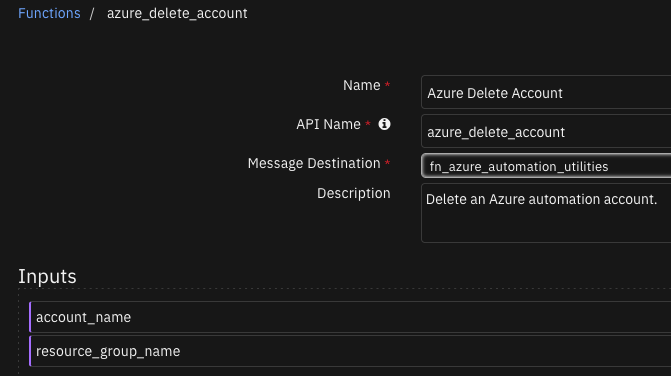
Inputs:
Name |
Type |
Required |
Example |
Tooltip |
|---|---|---|---|---|
|
|
No |
|
Azure Automation Account Name |
|
|
No |
|
Existing Azure automation resource group name |
Outputs:
NOTE: This example might be in JSON format, but
resultsis a Python Dictionary on the SOAR platform.
results = {
"content": {
"status": 200
},
"inputs": {
"account_name": "test-account",
"resource_group_name": "DemoAssets"
},
"metrics": {
"execution_time_ms": 5098,
"host": "local",
"package": "fn-azure-automation-utilities",
"package_version": "1.0.0",
"timestamp": "2023-07-25 08:24:31",
"version": "1.0"
},
"raw": null,
"reason": "",
"success": true,
"version": 2.0
}
Example Function Input Script:
inputs.account_name = row.account_name_accounts
inputs.resource_group_name = row.resource_group_accounts
Example Function Post Process Script:
from datetime import datetime
results = playbook.functions.results.account_delete
if results.get("success"):
incident.properties.azure_automation_create_ui_tab = True
status = results.get("content", {}).get("status")
if status == 200:
row.account_deleted_accounts = True
row.account_query_date = int(datetime.now().timestamp()*1000)
elif status == 204:
incident.addNote(f"""Azure Automation: Account Delete - Example (PB)
Inputs -
Account Name: {playbook.inputs.azure_automation_account_name}
Resource Group: {playbook.inputs.azure_automation_account_resource_group}
Results -
Azure automation account '{playbook.inputs.azure_automation_account_name}' not found.""")
Function - Azure Delete Credential¶
Delete the credential.
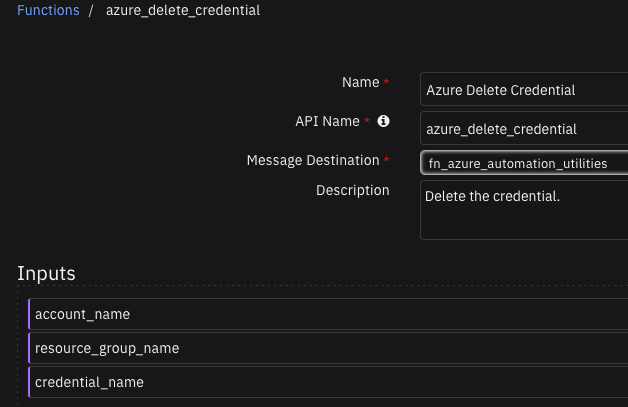
Inputs:
Name |
Type |
Required |
Example |
Tooltip |
|---|---|---|---|---|
|
|
No |
|
Azure Automation Account Name |
|
|
No |
|
Name of the Azure automation credential |
|
|
No |
|
Existing Azure automation resource group name |
Outputs:
NOTE: This example might be in JSON format, but
resultsis a Python Dictionary on the SOAR platform.
results = {
"content": {
"status": 200
},
"inputs": {
"account_name": "automation1",
"credential_name": "tes43",
"resource_group_name": "demoassets"
},
"metrics": {
"execution_time_ms": 1570,
"host": "local",
"package": "fn-azure-automation-utilities",
"package_version": "1.0.0",
"timestamp": "2023-08-21 14:16:11",
"version": "1.0"
},
"raw": null,
"reason": "",
"success": true,
"version": 2.0
}
Example Function Input Script:
inputs.account_name = row.account_name_credentials
inputs.resource_group_name = row.resource_group_credentials
inputs.credential_name = row.credential_name
Example Function Post Process Script:
from datetime import datetime
results = playbook.functions.results.delete_cred
if results.get("success"):
incident.properties.azure_automation_create_ui_tab = True
status = results.get("content", {}).get("status")
if status == 200:
row["credential_deleted"] = True
row["credential_query_date"] = int(datetime.now().timestamp()*1000)
elif status == 204:
incident.addNote(f"""Azure Automation: Credential Delete - Example (PB)
Inputs -
Account Name: {row.account_name}
Resource Group: {row.resource_group}
Credential Name: {row.credential_name}
Results -
Azure automation credential '{row.credential_name}' not found.""")
Function - Azure Delete Runbook¶
Delete the runbook by name.
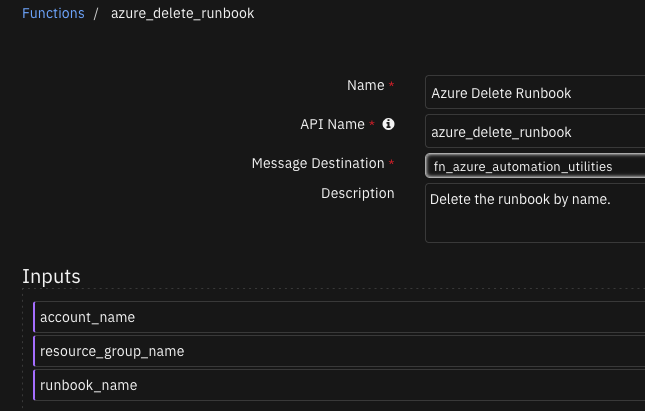
Inputs:
Name |
Type |
Required |
Example |
Tooltip |
|---|---|---|---|---|
|
|
No |
|
Azure Automation Account Name |
|
|
No |
|
Existing Azure automation resource group name |
|
|
No |
|
Runbook name in Azure Automation |
Outputs:
NOTE: This example might be in JSON format, but
resultsis a Python Dictionary on the SOAR platform.
results = {
"content": {
"status": 200
},
"inputs": {
"account_name": "automation1",
"resource_group_name": "demoassets",
"runbook_name": "test_fail"
},
"metrics": {
"execution_time_ms": 3220,
"host": "local",
"package": "fn-azure-automation-utilities",
"package_version": "1.0.0",
"timestamp": "2023-08-16 14:09:43",
"version": "1.0"
},
"raw": null,
"reason": "",
"success": true,
"version": 2.0
}
Example Function Input Script:
inputs.account_name = row.account_name_runbooks
inputs.resource_group_name = row.resource_group_runbooks
inputs.runbook_name = row.runbook_name
Example Function Post Process Script:
from datetime import datetime
results = playbook.functions.results.delete_runbook
if results.get("success"):
incident.properties.azure_automation_create_ui_tab = True
row.runbook_deleted = True
row.runbook_query_date = int(datetime.now().timestamp()*1000)
Function - Azure Delete Schedule¶
Delete the schedule identified by schedule name.
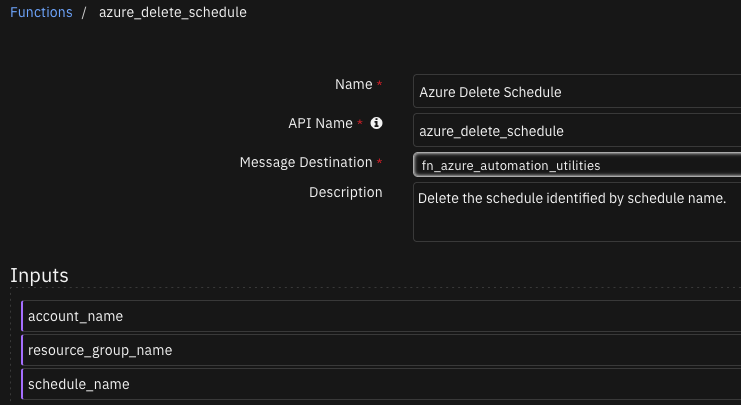
Inputs:
Name |
Type |
Required |
Example |
Tooltip |
|---|---|---|---|---|
|
|
No |
|
Azure Automation Account Name |
|
|
No |
|
Existing Azure automation resource group name |
|
|
No |
|
- |
Outputs:
NOTE: This example might be in JSON format, but
resultsis a Python Dictionary on the SOAR platform.
results = {
"content": {
"status": 200
},
"inputs": {
"account_name": "automation1",
"resource_group_name": "demoassets",
"schedule_name": "tester1324"
},
"metrics": {
"execution_time_ms": 1244,
"host": "local",
"package": "fn-azure-automation-utilities",
"package_version": "1.0.0",
"timestamp": "2023-08-24 11:38:33",
"version": "1.0"
},
"raw": null,
"reason": "",
"success": true,
"version": 2.0
}
Example Function Input Script:
inputs.account_name = row.account_name_schedules
inputs.resource_group_name = row.resource_group_schedules
inputs.schedule_name = row.schedule_name
Example Function Post Process Script:
from datetime import datetime
results = playbook.functions.results.delete_schedule
if results.get("success"):
incident.properties.azure_automation_create_ui_tab = True
status = results.get("content", {}).get("status")
if status == 200:
row["schedule_deleted"] = True
row["schedule_query_date"] = int(datetime.now().timestamp()*1000)
elif status == 204:
incident.addNote(f"""Azure Automation: Schedule Delete - Example (PB)
Inputs -
Account Name: {row.account_name}
Resource Group: {row.resource_group}
Schedule Name: {row.schedule_name}
Results -
Schedule '{row.schedule_name}' not found.""")
Function - Azure Execute Runbook¶
Execute a given Azure runbook and retrieve the results
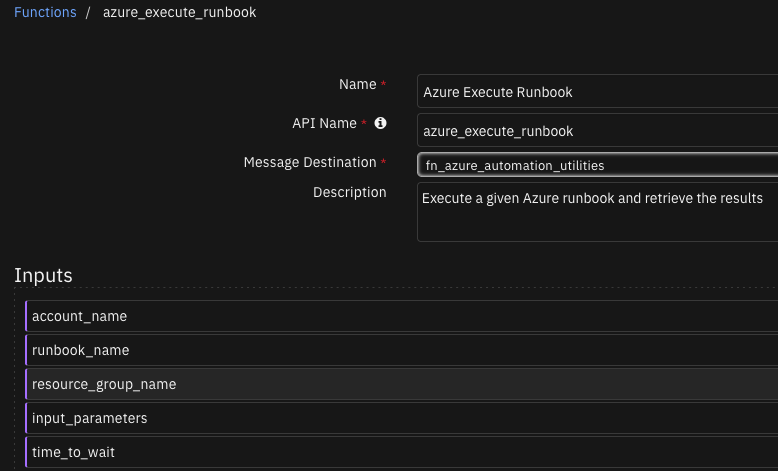
Inputs:
Name |
Type |
Required |
Example |
Tooltip |
|---|---|---|---|---|
|
|
No |
|
Azure Automation Account Name |
|
|
No |
|
string with dictionary format |
|
|
No |
|
Existing Azure automation resource group name |
|
|
No |
|
Runbook name in Azure Automation |
|
|
No |
|
Amount of seconds to wait in between Azure automation job status checks. This should be hold long it takes the given runbook to complete. |
Outputs:
NOTE: This example might be in JSON format, but
resultsis a Python Dictionary on the SOAR platform.
results = {
"content": "\r\nLocation : eastus\r\nTags : {}\r\nJobCount : 0\r\nRunbookType : PowerShell\r\nParameters : {}\r\nLogVerbose : False\r\nLogProgress : False\r\nLastModifiedBy : \r\nState : Published\r\nResourceGroupName : DemoAssets\r\nAutomationAccountName : automation1\r\nName : get_all_runbooks\r\nCreationTime : 7/19/2023 3:39:27 PM +00:00\r\nLastModifiedTime : 7/19/2023 4:03:24 PM +00:00\r\nDescription : Return all runbooks\r\n\r\n\r\nEnvironments \r\n------------ \r\n{[AzureChinaCloud, AzureChinaCloud], [AzureCloud, AzureCloud], [AzureGermanCloud, AzureGermanCloud], [AzureUSGovernme...\r\n\r\n",
"inputs": {
"account_name": "automation1",
"input_parameters": "{\u0027runbook_name\u0027: \u0027get_all_runbooks\u0027}",
"resource_group_name": "DemoAssets",
"runbook_name": "Get_given_runbook",
"time_to_wait": 20
},
"metrics": {
"execution_time_ms": 41660,
"host": "local",
"package": "fn-azure-automation-utilities",
"package_version": "1.0.0",
"timestamp": "2023-07-25 08:29:24",
"version": "1.0"
},
"raw": null,
"reason": null,
"success": true,
"version": 2.0
}
Example Function Input Script:
inputs.account_name = row.account_name_runbooks
if getattr(playbook.inputs, "azure_automation_runbook_input_parameters", None):
inputs.input_parameters = playbook.inputs.azure_automation_runbook_input_parameters
inputs.resource_group_name = row.resource_group_runbooks
inputs.runbook_name = row.runbook_name
time_to_wait = getattr(playbook.inputs, "time_to_wait", 30)
# If no time_to_wait is given then default to 30 seconds
inputs.time_to_wait = time_to_wait if time_to_wait else 30
Example Function Post Process Script:
results = playbook.functions.results.runbook_results
if results.get("success"):
incident.properties.azure_automation_create_ui_tab = True
incident.addNote(f"""Azure Automation: Runbook Execute - Example (PB)
Inputs -
Account Name: {row.account_name_runbooks}
Resource Group: {row.resource_group_runbooks}
Runbook Name: {row.runbook_name}
Time to Wait: {getattr(playbook.inputs, 'time_to_wait', 30)}
Input Parameters: {playbook.inputs.azure_automation_runbook_input_parameters}
Results -
{str(results.get('content', {}))}""")
Function - Azure Get Account¶
Get a specified Azure automation account information or list accounts.
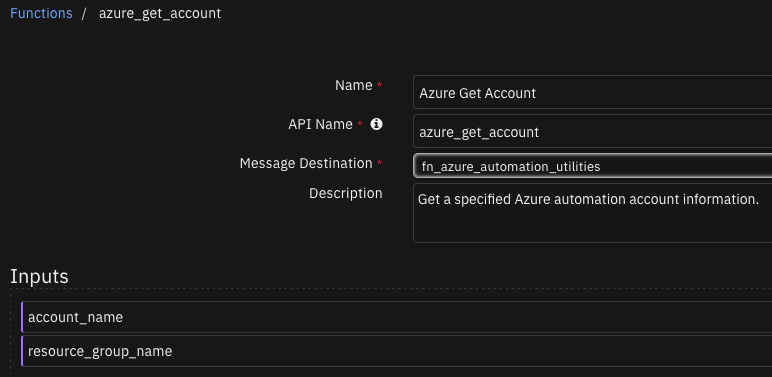
Inputs:
Name |
Type |
Required |
Example |
Tooltip |
|---|---|---|---|---|
|
|
No |
|
Azure Automation Account Name |
|
|
No |
|
Existing Azure automation resource group name |
Outputs:
NOTE: This example might be in JSON format, but
resultsis a Python Dictionary on the SOAR platform.
results = {
"content": {
"etag": null,
"id": "/subscriptions/abcdefgh-1234-abcd-1234-a1b2c3d4e5f6/resourceGroups/DemoAssets/providers/Microsoft.Automation/automationAccounts/testing352",
"identity": {
"principalId": "ee616124-e026-4ca0-8c64-d34bae779faf",
"tenantId": "50ad7d3e-b889-434d-802d-13b87c68047b",
"type": "SystemAssigned"
},
"location": "eastus",
"name": "testing352",
"properties": {
"RegistrationUrl": "https://99f846f3-c84d-4c96-af2b-cd0f7a5bd5d5.agentsvc.eus.azure-automation.net/accounts/99f846f3-c84d-4c96-af2b-cd0f7a5bd5d5",
"RuntimeConfiguration": {
"powershell": {
"builtinModules": {
"Az": "8.0.0"
}
},
"powershell7": {
"builtinModules": {
"Az": "8.0.0"
}
}
},
"automationHybridServiceUrl": "https://99f846f3-c84d-4c96-af2b-cd0f7a5bd5d5.jrds.eus.azure-automation.net/automationAccounts/99f846f3-c84d-4c96-af2b-cd0f7a5bd5d5",
"creationTime": "2023-07-25T12:05:22.16+00:00",
"disableLocalAuth": false,
"encryption": {
"identity": {
"userAssignedIdentity": null
},
"keySource": "Microsoft.Automation"
},
"lastModifiedBy": null,
"lastModifiedTime": "2023-07-25T12:05:22.16+00:00",
"privateEndpointConnections": [],
"publicNetworkAccess": true,
"sku": {
"capacity": null,
"family": null,
"name": "Basic"
},
"state": "Ok"
},
"systemData": {
"createdAt": "2023-07-25T12:05:22.16+00:00",
"lastModifiedAt": "2023-07-25T12:05:22.16+00:00"
},
"tags": {},
"type": "Microsoft.Automation/AutomationAccounts"
},
"inputs": {
"account_name": "testing352",
"resource_group_name": "DemoAssets"
},
"metrics": {
"execution_time_ms": 1433,
"host": "local",
"package": "fn-azure-automation-utilities",
"package_version": "1.0.0",
"timestamp": "2023-07-27 14:14:45",
"version": "1.0"
},
"raw": null,
"reason": null,
"success": true,
"version": 2.0
}
Example Function Input Script:
if getattr(playbook.inputs, "azure_automation_account_name", None):
inputs.account_name = playbook.inputs.azure_automation_account_name
if getattr(playbook.inputs, "azure_automation_resource_group_name", None):
inputs.resource_group_name = playbook.inputs.azure_automation_resource_group_name
Example Function Post Process Script:
from datetime import datetime
results = playbook.functions.results.account_info
def add_to_row(account):
account_id = account.get("id", "")
resourceGroup_start = account_id.find("resourceGroups/")+15
resource_group = account_id[resourceGroup_start:account_id.find("/providers", resourceGroup_start)]
row = incident.addRow("azure_automation_accounts")
row["account_name_accounts"] = account.get("name", "")
row["resource_group_accounts"] = resource_group
row["location_accounts"] = account.get("location", "")
row["tags_accounts"] = str(account.get("tags"))
row["publicnetworkaccess_accounts"] = account.get("properties", {}).get("publicNetworkAccess", None)
row["disablelocalauth_accounts"] = account.get("properties", {}).get("disableLocalAuth", None)
row["account_deleted_accounts"] = False
row["account_query_date"] = int(datetime.now().timestamp()*1000)
if results.get("success"):
incident.properties.azure_automation_create_ui_tab = True
content = results.get("content", {})
if content.get("value", None):
for account in content.get("value", []):
add_to_row(account)
else:
add_to_row(content)
Function - Azure Get Agent Registration Information¶
Retrieve the automation agent registration information.
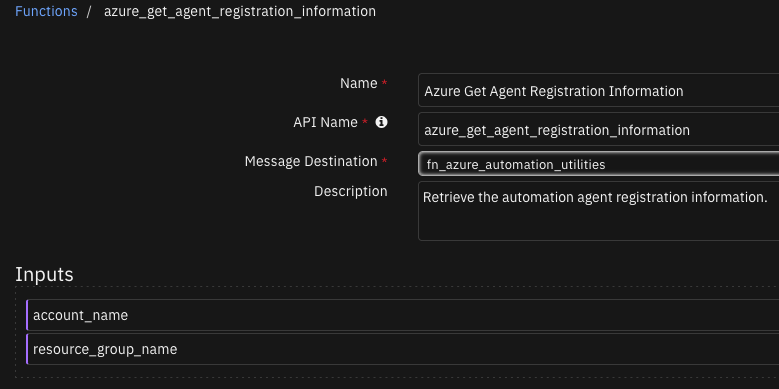
Inputs:
Name |
Type |
Required |
Example |
Tooltip |
|---|---|---|---|---|
|
|
No |
|
Azure Automation Account Name |
|
|
No |
|
Existing Azure automation resource group name |
Outputs:
NOTE: This example might be in JSON format, but
resultsis a Python Dictionary on the SOAR platform.
results = {
"content": {
"dscMetaConfiguration": "\r\n\tinstance of MSFT_WebDownloadManager as $MSFT_WebDownloadManager1ref\r\n\t{\r\n\tResourceID = \"[ConfigurationRepositoryWeb]AzureAutomationDSC\";\r\n\t SourceInfo = \"C:\\\\OaaS-RegistrationMetaConfig2.ps1::20::9::ConfigurationRepositoryWeb\";\r\n\t RegistrationKey = \"1234RYKSRuyfmINzCvic0Oz7DpGskIbty5W12345QbKWlsYT0BGp6qzfwz12345678vuh28cqRMoxDD39Iut7w==\"; \r\n\t ServerURL = \"https://abcdefgh-1234-abcd-1234-a1b2c3d4e5f6.agentsvc.eus.azure-automation.net/accounts/abcdefgh-1234-abcd-1234-a1b2c3d4e5f6\";\r\n\t};\r\n\r\n\tinstance of MSFT_WebResourceManager as $MSFT_WebResourceManager1ref\r\n\t{\r\n\t SourceInfo = \"C:\\\\OaaS-RegistrationMetaConfig2.ps1::27::9::ResourceRepositoryWeb\";\r\n\t ServerURL = \"https://abcdefgh-1234-abcd-1234-a1b2c3d4e5f6.agentsvc.eus.azure-automation.net/accounts/abcdefgh-1234-abcd-1234-a1b2c3d4e5f6\";\r\n\t ResourceID = \"[ResourceRepositoryWeb]AzureAutomationDSC\";\r\n\t RegistrationKey = \"1234RYKSRuyfmINzC*******pGskIbty5W12345QbKWlsYT0BGp6qzfwz12345678vuh28cqRMoxDD39Iut7w==\"; \r\n\t};\r\n\r\n\tinstance of MSFT_WebReportManager as $MSFT_WebReportManager1ref\r\n\t{\r\n\t SourceInfo = \"C:\\\\OaaS-RegistrationMetaConfig2.ps1::34::9::ReportServerWeb\";\r\n\t ServerURL = \"https://abcdefgh-1234-abcd-1234-a1b2c3d4e5f6.agentsvc.eus.azure-automation.net/accounts/abcdefgh-1234-abcd-1234-a1b2c3d4e5f6\";\r\n\t ResourceID = \"[ReportServerWeb]AzureAutomationDSC\";\r\n\t RegistrationKey = \"1234RYKSRuyfmINzCvic0Oz7DpGskIbty5W12345QbKWlsYT0BGp6qzfwz12345678vuh28cqRMoxDD39Iut7w==\"; \r\n\t};\r\n\r\n\tinstance of MSFT_DSCMetaConfiguration as $MSFT_DSCMetaConfiguration1ref\r\n\t{\r\n\t RefreshMode = \"Pull\";\r\n\t AllowModuleOverwrite = False;\r\n\t ActionAfterReboot = \"ContinueConfiguration\";\r\n\t RefreshFrequencyMins = 30;\r\n\t RebootNodeIfNeeded = False;\r\n\t ConfigurationModeFrequencyMins = 15;\r\n\t ConfigurationMode = \"ApplyAndMonitor\";\r\n\r\n\t ResourceModuleManagers = {\r\n\t $MSFT_WebResourceManager1ref \r\n\t};\r\n\t ReportManagers = {\r\n\t $MSFT_WebReportManager1ref \r\n\t };\r\n\t ConfigurationDownloadManagers = {\r\n\t $MSFT_WebDownloadManager1ref \r\n\t };\r\n\t};\r\n\r\n\tinstance of OMI_ConfigurationDocument\r\n\t{\r\n\t Version=\"2.0.0\";\r\n\t MinimumCompatibleVersion = \"2.0.0\";\r\n\t CompatibleVersionAdditionalProperties= { \"MSFT_DSCMetaConfiguration:StatusRetentionTimeInDays\" };\r\n\t Author=\"azureautomation\";\r\n\t GenerationDate=\"04/17/2015 11:41:09\";\r\n\t GenerationHost=\"azureautomation-01\";\r\n\t Name=\"RegistrationMetaConfig\";\r\n\t};\r\n\t",
"endpoint": "https://abcdefgh-1234-abcd-1234-a1b2c3d4e5f6.agentsvc.eus.azure-automation.net/accounts/abcdefgh-1234-abcd-1234-a1b2c3d4e5f6",
"id": "/subscriptions/abcdefgh-1234-abcd-1234-a1b2c3d4e5f6/resourceGroups/demoassets/providers/Microsoft.Automation/automationAccounts/automation1/agentRegistrationInformation/https://abcdefgh-1234-abcd-1234-a1b2c3d4e5f6.agentsvc.eus.azure-automation.net/accounts/abcdefgh-1234-abcd-1234-a1b2c3d4e5f6",
"keys": {
"primary": "1234RYKSRuyfmI*******7DpGskIbty5W12345QbKWlsYT0BGp6qzfwz12345678vuh28cqRMoxDD39Iut7w==",
"secondary": "bC6hr123456789qP*******rDRqfJMnJmUOhP123450/x53Vezc3rqDhherrLzb123456MWhub+86IKwxssg=="
}
},
"inputs": {
"account_name": "automation1",
"resource_group_name": "demoassets"
},
"metrics": {
"execution_time_ms": 1725,
"host": "local",
"package": "fn-azure-automation-utilities",
"package_version": "1.0.0",
"timestamp": "2023-08-21 09:45:31",
"version": "1.0"
},
"raw": null,
"reason": null,
"success": true,
"version": 2.0
}
Example Function Input Script:
inputs.account_name = playbook.inputs.azure_automation_account_name
inputs.resource_group_name = playbook.inputs.azure_automation_resource_group_name
Example Function Post Process Script:
from json import dumps
results = playbook.functions.results.registration_info
if results.get("success"):
incident.properties.azure_automation_create_ui_tab = True
incident.addNote(f"""Azure Automation: Agent Registration Get Information - Example (PB)
Inputs -
Account Name: {playbook.inputs.azure_automation_account_name}
Resource Group Name: {playbook.inputs.azure_automation_resource_group_name}
Results -
{dumps(results.get('content', {}), indent=4)}""")
Function - Azure Get Credential¶
Get credential from given credential name or list all credentials on given resource group.
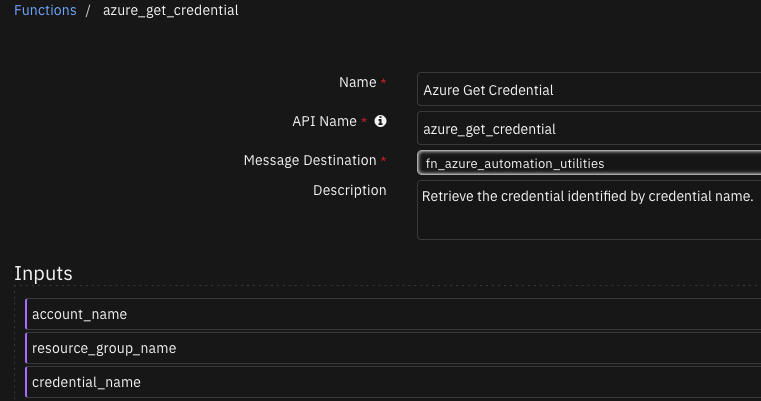
Inputs:
Name |
Type |
Required |
Example |
Tooltip |
|---|---|---|---|---|
|
|
No |
|
Azure Automation Account Name |
|
|
No |
|
Name of the Azure automation credential |
|
|
No |
|
Existing Azure automation resource group name |
Outputs:
NOTE: This example might be in JSON format, but
resultsis a Python Dictionary on the SOAR platform.
results = {
"content": {
"id": "/subscriptions/abcdefgh-1234-abcd-1234-a1b2c3d4e5f6/resourceGroups/demoassets/providers/Microsoft.Automation/automationAccounts/automation1/credentials/tes43",
"name": "tes43",
"properties": {
"creationTime": "2023-08-21T18:14:38.87+00:00",
"description": null,
"lastModifiedTime": "2023-08-21T18:14:38.87+00:00",
"userName": "tes43"
},
"type": "Microsoft.Automation/AutomationAccounts/Credentials"
},
"inputs": {
"account_name": "automation1",
"credential_name": "tes43",
"resource_group_name": "demoassets"
},
"metrics": {
"execution_time_ms": 1393,
"host": "local",
"package": "fn-azure-automation-utilities",
"package_version": "1.0.0",
"timestamp": "2023-08-21 14:15:23",
"version": "1.0"
},
"raw": null,
"reason": null,
"success": true,
"version": 2.0
}
Example Function Input Script:
inputs.account_name = playbook.inputs.azure_automation_account_name
inputs.resource_group_name = playbook.inputs.azure_automation_resource_group
if getattr(playbook.inputs, "azure_automation_credential_name", None):
inputs.credential_name = getattr(playbook.inputs, "azure_automation_credential_name", None)
Example Function Post Process Script:
from datetime import datetime
results = playbook.functions.results.cred
# Add credential information to data table
def add_to_row(credential):
row = incident.addRow("azure_automation_credentials")
row["credential_name"] = credential.get("name")
row["credential_username"] = credential.get("properties", {}).get("userName")
row["credential_description"] = credential.get("properties", {}).get("description")
row["account_name_credentials"] = playbook.inputs.azure_automation_account_name
row["resource_group_credentials"] = playbook.inputs.azure_automation_resource_group
row["credential_deleted"] = False
row["credential_query_date"] = int(datetime.now().timestamp()*1000)
if results.get("success"):
incident.properties.azure_automation_create_ui_tab = True
content = results.get('content', {})
if content.get("value", []):
# If list of credentials returned
for credential in content.get("value", []):
add_to_row(credential)
elif content.get("name", None): # If single credential returned
add_to_row(content)
Function - Azure Get Job¶
Retrieve the job info or job output identified by job name or list jobs.
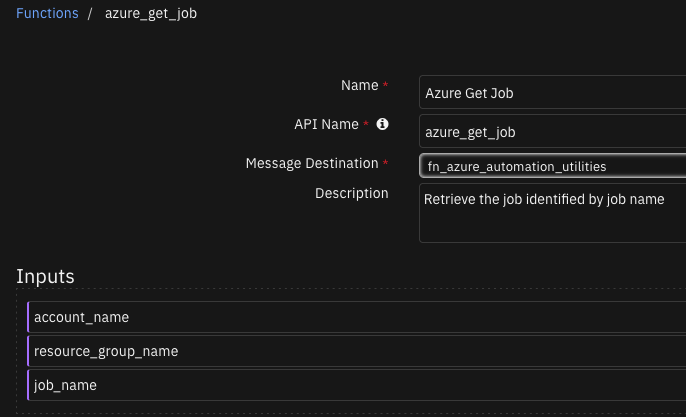
Inputs:
Name |
Type |
Required |
Example |
Tooltip |
|---|---|---|---|---|
|
|
No |
|
Azure Automation Account Name |
|
|
No |
|
Azure Automation job name |
|
|
No |
|
If True will return Job output. If False will return job details |
|
|
No |
|
Existing Azure automation resource group name |
Outputs:
NOTE: This example might be in JSON format, but
resultsis a Python Dictionary on the SOAR platform.
results = {
"content": {
"id": "/subscriptions/abcdefgh-1234-abcd-1234-a1b2c3d4e5f6/resourceGroups/demoassets/providers/Microsoft.Automation/automationAccounts/automation1/jobs/1692024049238",
"name": "1692024049238",
"properties": {
"creationTime": "2023-08-14T14:42:29.5306946+00:00",
"endTime": "2023-08-14T14:42:55.9297673+00:00",
"exception": null,
"jobId": "efe4db52-a124-4bea-9582-7b0c7f7133e4",
"lastModifiedTime": "2023-08-14T14:42:55.9297673+00:00",
"lastStatusModifiedTime": "2023-08-14T14:42:55.9297673+00:00",
"parameters": {
"runbook_name": "get_all_runbooks"
},
"provisioningState": "Succeeded",
"runOn": "",
"runbook": {
"name": "Get_given_runbook"
},
"startTime": "2023-08-14T14:42:41.9604553+00:00",
"startedBy": "{scrubbed}",
"status": "Completed",
"statusDetails": "None"
},
"type": "Microsoft.Automation/AutomationAccounts/Jobs"
},
"inputs": {
"account_name": "automation1",
"job_name": "1692024049238",
"resource_group_name": "demoassets"
},
"metrics": {
"execution_time_ms": 533,
"host": "local",
"package": "fn-azure-automation-utilities",
"package_version": "1.0.0",
"timestamp": "2023-08-16 14:52:41",
"version": "1.0"
},
"raw": null,
"reason": null,
"success": true,
"version": 2.0
}
Example Function Input Script:
inputs.account_name = playbook.inputs.azure_automation_account_name
inputs.resource_group_name = playbook.inputs.azure_automation_resource_group_name
if getattr(playbook.inputs, "azure_automation_job_name", None):
inputs.job_name = playbook.inputs.azure_automation_job_name
Example Function Post Process Script:
from json import dumps
results = playbook.functions.results.job_results
if results.get("success"):
incident.properties.azure_automation_create_ui_tab = True
incident.addNote(f"""Azure Automation: Job Get - Example (PB)
Inputs -
Account Name: {playbook.inputs.azure_automation_account_name}
Resource Group: {playbook.inputs.azure_automation_resource_group_name}
Job Name: {getattr(playbook.inputs, 'azure_automation_job_name', None)}
Results -
{dumps(results.get('content', {}), indent=4)}""")
Function - Azure Get Module Activity¶
Retrieve the activity in the module identified by module name and activity name or Retrieve a list of activities in the module identified by module name.
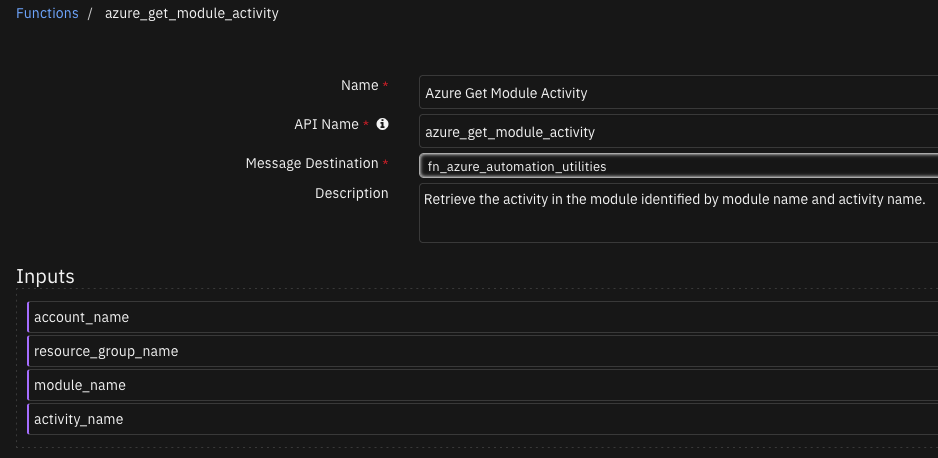
Inputs:
Name |
Type |
Required |
Example |
Tooltip |
|---|---|---|---|---|
|
|
No |
|
Azure Automation Account Name |
|
|
No |
|
The Azure automation module activity name |
|
|
No |
|
The name of the Azure automation module. |
|
|
No |
|
Existing Azure automation resource group name |
Outputs:
NOTE: This example might be in JSON format, but
resultsis a Python Dictionary on the SOAR platform.
results = {
"content": {
"id": "/subscriptions/abcdefgh-1234-abcd-1234-a1b2c3d4e5f6/resourceGroups/demoassets/providers/Microsoft.Automation/automationAccounts/automation1/modules/Az.Advisor/activities/Set-AzAdvisorConfiguration",
"name": "Set-AzAdvisorConfiguration",
"properties": {
"creationTime": "2022-07-06T10:01:53.9133333+00:00",
"definition": "",
"description": "Updates or creates the Azure Advisor Configuration. ^https://docs.microsoft.com/powershell/module/az.advisor/set-azadvisorConfiguration^",
"lastModifiedTime": "2022-07-06T10:01:53.9133333+00:00",
"outputTypes": [
{
"name": "Microsoft.Azure.Commands.Advisor.Cmdlets.Models.PsAzureAdvisorConfigurationData",
"type": "Microsoft.Azure.Commands.Advisor.Cmdlets.Models.PsAzureAdvisorConfigurationData"
}
],
"parameterSets": [
{
"name": "InputObjectLowCpuExcludeParameterSet",
"parameters": [
{
"description": null,
"isDynamic": false,
"isMandatory": false,
"name": "DefaultProfile",
"position": -2147483648,
"type": "Microsoft.Azure.Commands.Common.Authentication.Abstractions.Core.IAzureContextContainer",
"validationSet": [],
"valueFromPipeline": false,
"valueFromPipelineByPropertyName": false,
"valueFromRemainingArguments": false
},
{
"description": null,
"isDynamic": false,
"isMandatory": false,
"name": "Exclude",
"position": 2,
"type": "System.Management.Automation.SwitchParameter",
"validationSet": [],
"valueFromPipeline": false,
"valueFromPipelineByPropertyName": false,
"valueFromRemainingArguments": false
},
{
"description": null,
"isDynamic": false,
"isMandatory": true,
"name": "LowCpuThreshold",
"position": 0,
"type": "System.Int32",
"validationSet": [],
"valueFromPipeline": false,
"valueFromPipelineByPropertyName": false,
"valueFromRemainingArguments": false
},
{
"description": null,
"isDynamic": false,
"isMandatory": false,
"name": "WhatIf",
"position": -2147483648,
"type": "System.Management.Automation.SwitchParameter",
"validationSet": [],
"valueFromPipeline": false,
"valueFromPipelineByPropertyName": false,
"valueFromRemainingArguments": false
},
{
"description": null,
"isDynamic": false,
"isMandatory": false,
"name": "InputObject",
"position": 1,
"type": "Microsoft.Azure.Commands.Advisor.Cmdlets.Models.PsAzureAdvisorConfigurationData",
"validationSet": [],
"valueFromPipeline": true,
"valueFromPipelineByPropertyName": false,
"valueFromRemainingArguments": false
},
{
"description": null,
"isDynamic": false,
"isMandatory": false,
"name": "Confirm",
"position": -2147483648,
"type": "System.Management.Automation.SwitchParameter",
"validationSet": [],
"valueFromPipeline": false,
"valueFromPipelineByPropertyName": false,
"valueFromRemainingArguments": false
}
]
},
{
"name": "InputObjectRgExcludeParameterSet",
"parameters": [
{
"description": null,
"isDynamic": false,
"isMandatory": false,
"name": "InputObject",
"position": 1,
"type": "Microsoft.Azure.Commands.Advisor.Cmdlets.Models.PsAzureAdvisorConfigurationData",
"validationSet": [],
"valueFromPipeline": true,
"valueFromPipelineByPropertyName": false,
"valueFromRemainingArguments": false
},
{
"description": null,
"isDynamic": false,
"isMandatory": false,
"name": "Exclude",
"position": 2,
"type": "System.Management.Automation.SwitchParameter",
"validationSet": [],
"valueFromPipeline": false,
"valueFromPipelineByPropertyName": false,
"valueFromRemainingArguments": false
},
{
"description": null,
"isDynamic": false,
"isMandatory": false,
"name": "Confirm",
"position": -2147483648,
"type": "System.Management.Automation.SwitchParameter",
"validationSet": [],
"valueFromPipeline": false,
"valueFromPipelineByPropertyName": false,
"valueFromRemainingArguments": false
},
{
"description": null,
"isDynamic": false,
"isMandatory": false,
"name": "ResourceGroupName",
"position": 0,
"type": "System.String",
"validationSet": [],
"valueFromPipeline": false,
"valueFromPipelineByPropertyName": false,
"valueFromRemainingArguments": false
},
{
"description": null,
"isDynamic": false,
"isMandatory": false,
"name": "WhatIf",
"position": -2147483648,
"type": "System.Management.Automation.SwitchParameter",
"validationSet": [],
"valueFromPipeline": false,
"valueFromPipelineByPropertyName": false,
"valueFromRemainingArguments": false
},
{
"description": null,
"isDynamic": false,
"isMandatory": false,
"name": "DefaultProfile",
"position": -2147483648,
"type": "Microsoft.Azure.Commands.Common.Authentication.Abstractions.Core.IAzureContextContainer",
"validationSet": [],
"valueFromPipeline": false,
"valueFromPipelineByPropertyName": false,
"valueFromRemainingArguments": false
}
]
}
],
"type": null
},
"type": null
},
"inputs": {
"account_name": "automation1",
"activity_name": "Set-AzAdvisorConfiguration",
"module_name": "Az.Advisor",
"resource_group_name": "demoassets"
},
"metrics": {
"execution_time_ms": 2203,
"host": "local",
"package": "fn-azure-automation-utilities",
"package_version": "1.0.0",
"timestamp": "2023-08-14 10:52:19",
"version": "1.0"
},
"raw": null,
"reason": null,
"success": true,
"version": 2.0
}
Example Function Input Script:
inputs.account_name = playbook.inputs.azure_automation_account_name
inputs.module_name = playbook.inputs.azure_automation_module_name
inputs.resource_group_name = playbook.inputs.azure_automation_resource_group_name
if getattr(playbook.inputs, "azure_automation_activity_name", None):
inputs.activity_name = playbook.inputs.azure_automation_activity_name
Example Function Post Process Script:
from json import dumps
results = playbook.functions.results.module_activity
if results.get("success"):
incident.properties.azure_automation_create_ui_tab = True
incident.addNote(f"""Azure Automation: Module Get Activity - Example (PB)
Inputs -
Account Name: {playbook.inputs.azure_automation_account_name}
Resource Group: {playbook.inputs.azure_automation_resource_group_name}
Module Name: {playbook.inputs.azure_automation_module_name}
Activity Name: {getattr(playbook.inputs, 'azure_automation_activity_name', None)}
Results -
{dumps(results.get('content', {}), indent=4)}""")
Function - Azure Get Node Report¶
Retrieve the Dsc node report data by node id and report id or List Dsc node reports by node id.
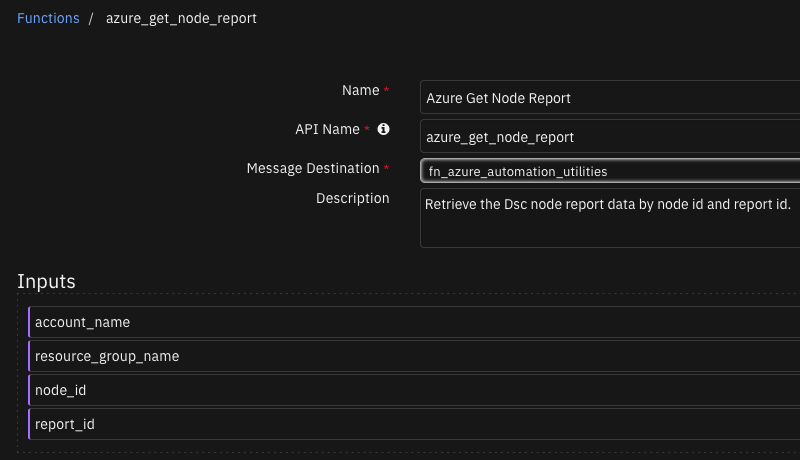
Inputs:
Name |
Type |
Required |
Example |
Tooltip |
|---|---|---|---|---|
|
|
No |
|
Azure Automation Account Name |
|
|
Yes |
|
Azure Automation Dsc node ID |
|
|
No |
|
Azure Automation Dsc node report ID |
|
|
No |
|
Existing Azure automation resource group name |
Outputs:
NOTE: This example might be in JSON format, but
resultsis a Python Dictionary on the SOAR platform.
results = {
"content": {
"configurationVersion": "2.0.0",
"endTime": "2023-09-06T13:30:02.1606975+00:00",
"errors": [],
"hostName": null,
"iPV4Addresses": [],
"iPV6Addresses": [],
"id": "/subscriptions/abcdefgh-1234-abcd-1234-a1b2c3d4e5f6/resourceGroups/DemoAssets/providers/Microsoft.Automation/automationAccounts/automation1/nodes/24939717-e819-4059-aa08-82862c65f3c8/reports/3c47f0b6-aeb7-429a-a656-70f2a19ab22a",
"lastModifiedTime": "2023-09-06T13:30:02.2533333+00:00",
"metaConfiguration": null,
"numberOfResources": 0,
"rawErrors": null,
"rebootRequested": null,
"refreshMode": null,
"reportFormatVersion": "2.0",
"reportId": "3c47f0b6-aeb7-429a-a656-70f2a19ab22a",
"resources": [],
"startTime": "2023-09-06T13:30:01.9451859+00:00",
"status": "Compliant",
"type": "Consistency"
},
"inputs": {
"account_name": "automation1",
"node_id": "24939717-e819-4059-aa08-82862c65f3c8",
"report_id": "3c47f0b6-aeb7-429a-a656-70f2a19ab22a",
"resource_group_name": "DemoAssets"
},
"metrics": {
"execution_time_ms": 1084,
"host": "local",
"package": "fn-azure-automation-utilities",
"package_version": "1.0.0",
"timestamp": "2023-09-06 09:55:00",
"version": "1.0"
},
"raw": null,
"reason": null,
"success": true,
"version": 2.0
}
Example Function Input Script:
inputs.account_name = playbook.inputs.azure_automation_account_name
inputs.node_id = playbook.inputs.azure_automation_node_id
inputs.resource_group_name = playbook.inputs.azure_automation_resource_group_name
if getattr(playbook.inputs, "azure_automation_report_id", None):
inputs.report_id = playbook.inputs.azure_automation_report_id
Example Function Post Process Script:
from json import dumps
results = playbook.functions.results.node_report
if results.get("success"):
incident.properties.azure_automation_create_ui_tab = True
incident.addNote(f"""Azure Automation: Node Get Report - Example (PB)
Inputs -
Account Name: {playbook.inputs.azure_automation_account_name}
Resource Group: {playbook.inputs.azure_automation_resource_group_name}
Node ID: {playbook.inputs.azure_automation_node_id}
Report ID: {getattr(playbook.inputs, 'azure_automation_report_id', None)}
Results -
{dumps(results.get('content', {}), indent=4)}""")
Function - Azure Get Runbook¶
Retrieve the runbook identified by runbook name or list runbooks on given account.
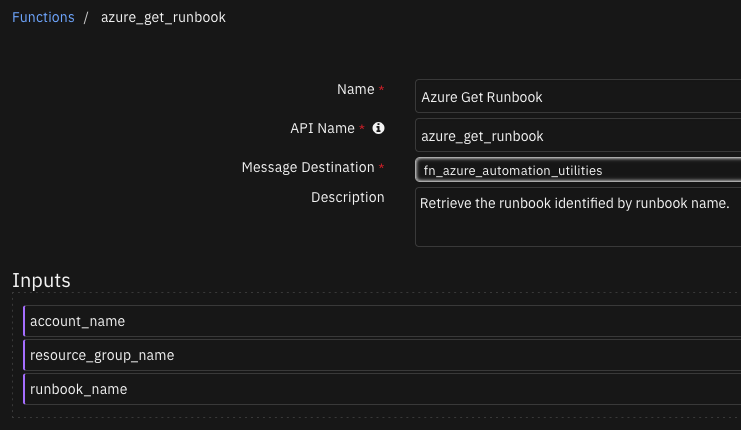
Inputs:
Name |
Type |
Required |
Example |
Tooltip |
|---|---|---|---|---|
|
|
No |
|
Azure Automation Account Name |
|
|
No |
|
Existing Azure automation resource group name |
|
|
No |
|
Runbook name in Azure Automation |
Outputs:
NOTE: This example might be in JSON format, but
resultsis a Python Dictionary on the SOAR platform.
results = {
"content": {
"etag": "\"638246066435733333\"",
"id": "/subscriptions/abcdefgh-1234-abcd-1234-a1b2c3d4e5f6/resourceGroups/demoassets/providers/Microsoft.Automation/automationAccounts/automation1/runbooks/Hello_world",
"location": "eastus",
"name": "Hello_world",
"properties": {
"creationTime": "2023-07-10T17:22:53.7066667+00:00",
"description": "My first python 3 runbook",
"draft": null,
"jobCount": 0,
"lastModifiedBy": null,
"lastModifiedTime": "2023-07-10T17:24:03.5733333+00:00",
"logActivityTrace": 0,
"logProgress": false,
"logVerbose": false,
"outputTypes": [],
"parameters": {},
"provisioningState": "Succeeded",
"runbookType": "Python3",
"serviceManagementTags": null,
"state": "Published"
},
"tags": {},
"type": "Microsoft.Automation/AutomationAccounts/Runbooks"
},
"inputs": {
"account_name": "automation1",
"resource_group_name": "demoassets",
"runbook_name": "Hello_world"
},
"metrics": {
"execution_time_ms": 7989,
"host": "local",
"package": "fn-azure-automation-utilities",
"package_version": "1.0.0",
"timestamp": "2023-08-16 10:20:00",
"version": "1.0"
},
"raw": null,
"reason": null,
"success": true,
"version": 2.0
}
Example Function Input Script:
inputs.account_name = playbook.inputs.azure_automation_account_name
inputs.resource_group_name = playbook.inputs.azure_resource_group
if getattr(playbook.inputs, 'azure_automation_runbook_name', None):
inputs.runbook_name = playbook.inputs.azure_automation_runbook_name
Example Function Post Process Script:
from datetime import datetime
results = playbook.functions.results.runbook_results
# Add runbooks info to the data table
def add_to_row(runbook):
row = incident.addRow("azure_automation_runbooks")
row["runbook_name"] = runbook.get("name")
row["runbook_type"] = runbook.get("properties", {}).get("runbookType")
row["runbook_state"] = runbook.get("properties", {}).get("state")
row["runbook_tags"] = str(runbook.get("tags"))
row["account_name_runbooks"] = playbook.inputs.azure_automation_account_name
row["resource_group_runbooks"] = playbook.inputs.azure_resource_group
row["runbook_deleted"] = False
row["runbook_query_date"] = int(datetime.now().timestamp()*1000)
if results.get("success"):
incident.properties.azure_automation_create_ui_tab = True
content = results.get("content", {})
if content.get("value", None):
# If list of runbooks returned
for runbook in content.get("value", []):
add_to_row(runbook)
else: # If single runbook returned
add_to_row(content)
Function - Azure Get Schedule¶
Retrieve the schedule identified by schedule name or list schedules.
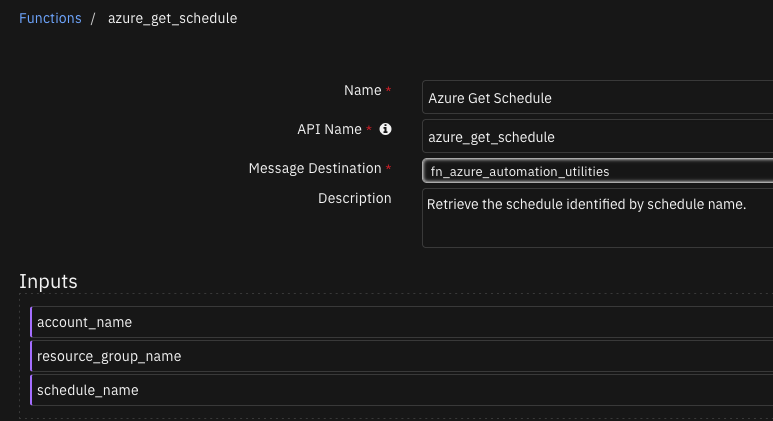
Inputs:
Name |
Type |
Required |
Example |
Tooltip |
|---|---|---|---|---|
|
|
No |
|
Azure Automation Account Name |
|
|
No |
|
Existing Azure automation resource group name |
|
|
No |
|
- |
Outputs:
NOTE: This example might be in JSON format, but
resultsis a Python Dictionary on the SOAR platform.
results = {
"content": {
"id": "/subscriptions/abcdefgh-1234-abcd-1234-a1b2c3d4e5f6/resourceGroups/demoassets/providers/Microsoft.Automation/automationAccounts/automation1/schedules/tester1324",
"name": "tester1324",
"properties": {
"advancedSchedule": null,
"creationTime": "2023-08-24T15:31:44.2666667+00:00",
"description": "something",
"expiryTime": "2023-08-25T08:40:00+00:00",
"expiryTimeOffsetMinutes": 0.0,
"frequency": "OneTime",
"interval": null,
"isEnabled": true,
"lastModifiedTime": "2023-08-24T15:31:44.2666667+00:00",
"nextRun": "2023-08-25T08:40:00+00:00",
"nextRunOffsetMinutes": 0.0,
"startTime": "2023-08-25T08:40:00+00:00",
"startTimeOffsetMinutes": 0.0,
"timeZone": "Etc/UTC"
},
"type": "Microsoft.Automation/AutomationAccounts/Schedules"
},
"inputs": {
"account_name": "automation1",
"resource_group_name": "demoassets",
"schedule_name": "tester1324"
},
"metrics": {
"execution_time_ms": 1586,
"host": "local",
"package": "fn-azure-automation-utilities",
"package_version": "1.0.0",
"timestamp": "2023-08-24 11:33:14",
"version": "1.0"
},
"raw": null,
"reason": null,
"success": true,
"version": 2.0
}
Example Function Input Script:
inputs.account_name = playbook.inputs.azure_automation_account_name
inputs.resource_group_name = playbook.inputs.azure_automation_resource_group
if getattr(playbook.inputs, "azure_automation_schedule_name", None):
inputs.schedule_name = playbook.inputs.azure_automation_schedule_name
Example Function Post Process Script:
from datetime import datetime
results = playbook.functions.results.get_schedule
# Add schedule information to data table
def row_to_add(schedule):
row = incident.addRow("azure_automation_schedules")
row["schedule_name"] = schedule.get("name", "")
row["schedule_description"] = schedule.get("properties", {}).get("description", None)
row["schedule_enabled"] = schedule.get("properties", {}).get("isEnabled", False)
row["schedule_start_time"] = schedule.get("properties", {}).get("startTime", None)
row["schedule_expiry_time"] = schedule.get("properties", {}).get("expiryTime", None)
row["schedule_frequency"] = schedule.get("properties", {}).get("frequency", None)
row["schedule_interval"] = schedule.get("properties", {}).get("interval", 1)
row["schedule_time_zone"] = schedule.get("properties", {}).get("timeZone", None)
row["advanced_schedule"] = str(schedule.get("properties", {}).get("advancedSchedule", {}))
row["account_name_schedules"] = playbook.inputs.azure_automation_account_name
row["resource_group_schedules"] = playbook.inputs.azure_automation_resource_group
row["schedule_deleted"] = False
row["schedule_query_date"] = int(datetime.now().timestamp()*1000)
if results.get("success"):
incident.properties.azure_automation_create_ui_tab = True
content = results.get("content", {})
if content.get("value", None):
# If list of schedules returned
for schedule in content.get("value", []):
row_to_add(schedule)
else: # If single schedule returned
row_to_add(content)
Function - Azure List Statistics by Automation Account¶
Retrieve the statistics for the account.
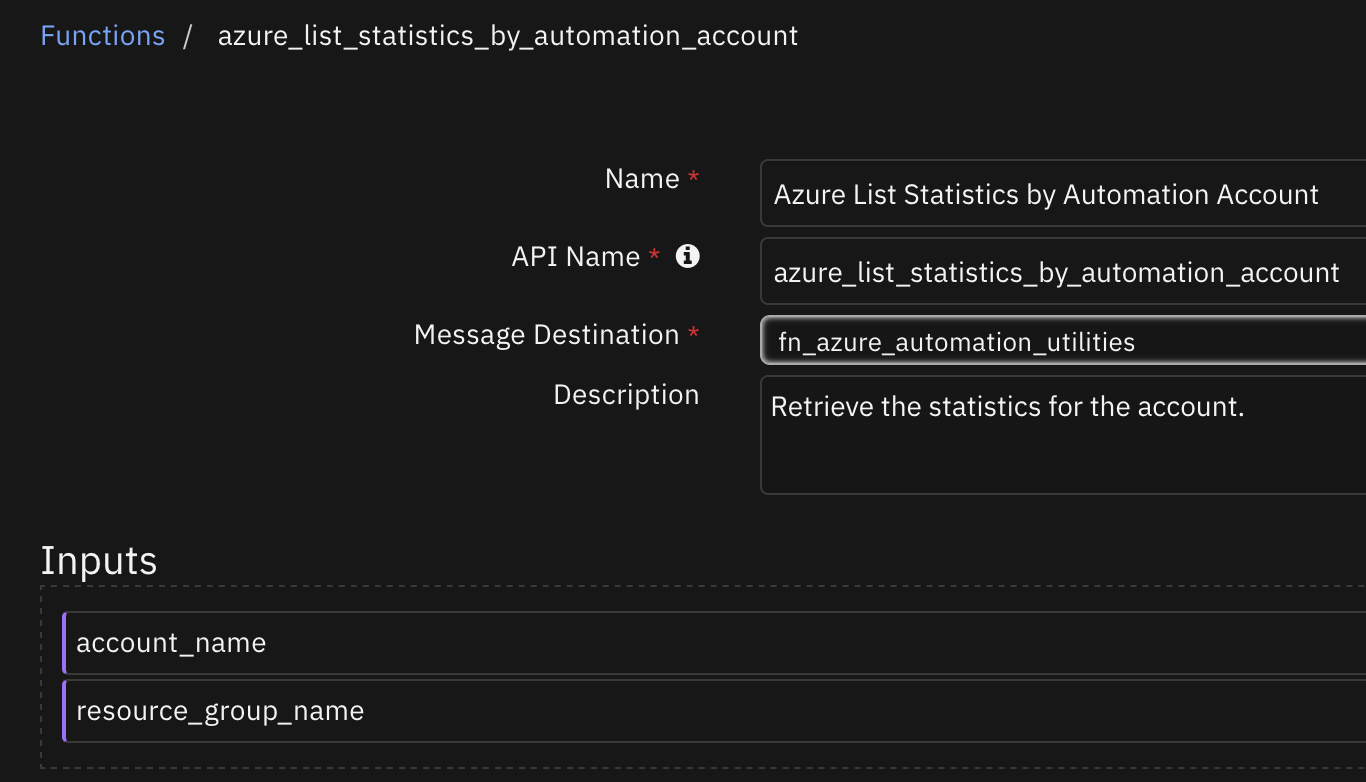
Inputs:
Name |
Type |
Required |
Example |
Tooltip |
|---|---|---|---|---|
|
|
No |
|
Azure Automation Account Name |
|
|
No |
|
Existing Azure automation resource group name |
Outputs:
NOTE: This example might be in JSON format, but
resultsis a Python Dictionary on the SOAR platform.
results = {
"content": {
"value": [
{
"counterProperty": "New",
"counterValue": 0,
"endTime": "2023-09-06T13:58:01.5985342+00:00",
"id": "/subscriptions/abcdefgh-1234-abcd-1234-a1b2c3d4e5f6/resourceGroups/DemoAssets/providers/Microsoft.Automation/automationAccounts/automation1/statistics/New",
"startTime": "2023-08-30T13:58:01.5985342+00:00"
},
{
"counterProperty": "Activating",
"counterValue": 0,
"endTime": "2023-09-06T13:58:01.5985342+00:00",
"id": "/subscriptions/abcdefgh-1234-abcd-1234-a1b2c3d4e5f6/resourceGroups/DemoAssets/providers/Microsoft.Automation/automationAccounts/automation1/statistics/Activating",
"startTime": "2023-08-30T13:58:01.5985342+00:00"
},
{
"counterProperty": "Running",
"counterValue": 0,
"endTime": "2023-09-06T13:58:01.5985342+00:00",
"id": "/subscriptions/abcdefgh-1234-abcd-1234-a1b2c3d4e5f6/resourceGroups/DemoAssets/providers/Microsoft.Automation/automationAccounts/automation1/statistics/Running",
"startTime": "2023-08-30T13:58:01.5985342+00:00"
},
{
"counterProperty": "Completed",
"counterValue": 0,
"endTime": "2023-09-06T13:58:01.5985342+00:00",
"id": "/subscriptions/abcdefgh-1234-abcd-1234-a1b2c3d4e5f6/resourceGroups/DemoAssets/providers/Microsoft.Automation/automationAccounts/automation1/statistics/Completed",
"startTime": "2023-08-30T13:58:01.5985342+00:00"
},
{
"counterProperty": "Failed",
"counterValue": 0,
"endTime": "2023-09-06T13:58:01.5985342+00:00",
"id": "/subscriptions/abcdefgh-1234-abcd-1234-a1b2c3d4e5f6/resourceGroups/DemoAssets/providers/Microsoft.Automation/automationAccounts/automation1/statistics/Failed",
"startTime": "2023-08-30T13:58:01.5985342+00:00"
}
]
},
"inputs": {
"account_name": "automation1",
"resource_group_name": "DemoAssets"
},
"metrics": {
"execution_time_ms": 773,
"host": "local",
"package": "fn-azure-automation-utilities",
"package_version": "1.0.0",
"timestamp": "2023-09-06 09:58:01",
"version": "1.0"
},
"raw": null,
"reason": null,
"success": true,
"version": 2.0
}
Example Function Input Script:
inputs.account_name = playbook.inputs.azure_automation_account_name
inputs.resource_group_name = playbook.inputs.azure_automation_resource_group_name
Example Function Post Process Script:
from datetime import datetime
results = playbook.functions.results.statistics
if results.get("success"):
incident.properties.azure_automation_create_ui_tab = True
for stat in results.get("content", {}).get("value", []):
row = incident.addRow("azure_automation_statistics")
row["statistic_counter_property"] = stat.get("counterProperty", None)
row["statistic_counter_value"] = stat.get("counterValue", 0)
row["account_name_statistics"] = playbook.inputs.azure_automation_account_name
row["resource_group_statistics"] = playbook.inputs.azure_automation_resource_group_name
row["statistic_query_date"] = int(datetime.now().timestamp()*1000)
Function - Azure Regenerate Agent Registration Key¶
Regenerate a primary or secondary agent registration key
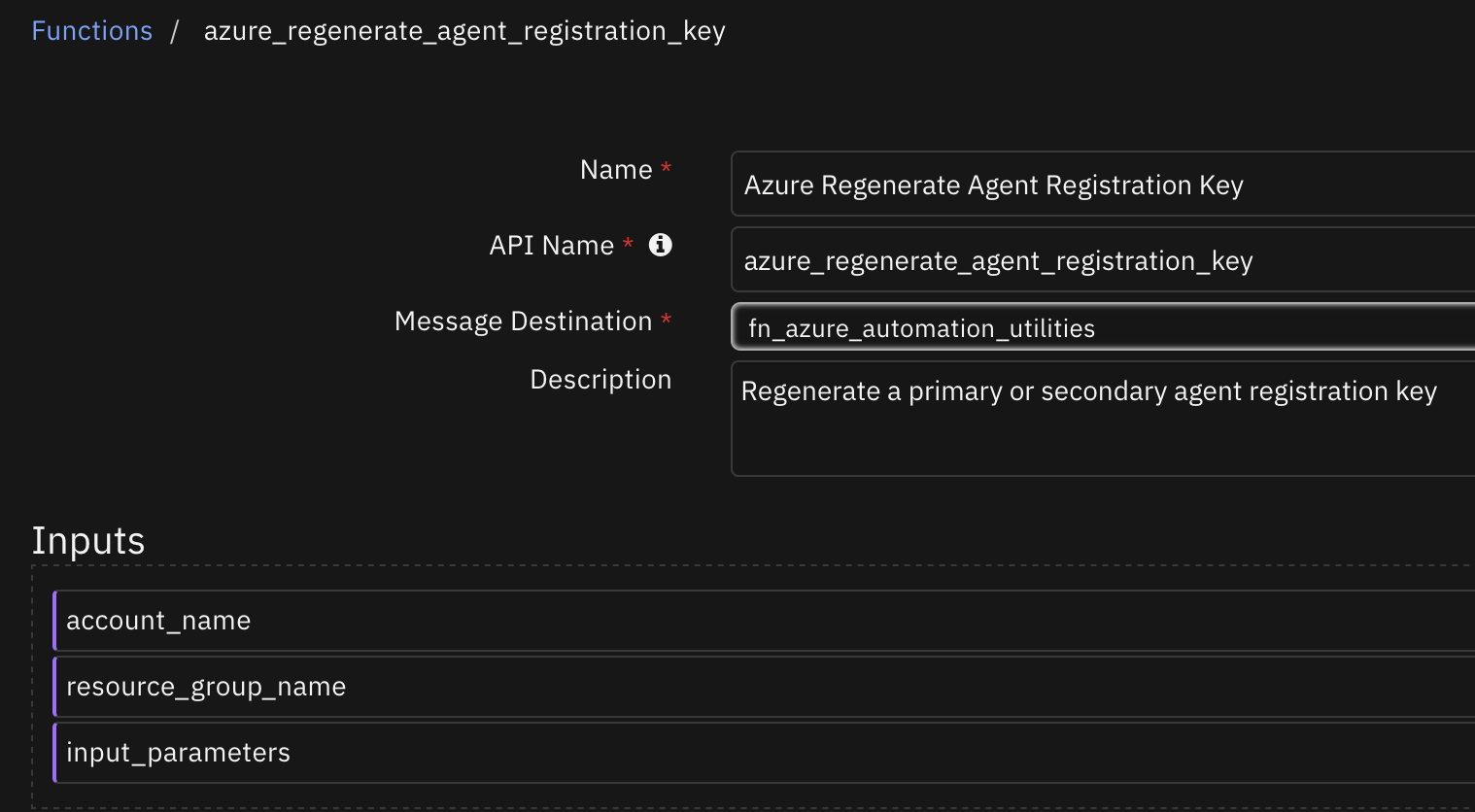
Inputs:
Name |
Type |
Required |
Example |
Tooltip |
|---|---|---|---|---|
|
|
No |
|
Azure Automation Account Name |
|
|
No |
|
string with dictionary format |
|
|
No |
|
Existing Azure automation resource group name |
Outputs:
NOTE: This example might be in JSON format, but
resultsis a Python Dictionary on the SOAR platform.
results = {
"content": {
"dscMetaConfiguration": null,
"endpoint": "https://abcdefgh-1234-abcd-1234-a1b2c3d4e5f6.agentsvc.eus.azure-automation.net/accounts/abcdefgh-1234-abcd-1234-a1b2c3d4e5f6",
"id": null,
"keys": {
"primary": "g+Z4E/12345678c/YbuFnwTe4yI12EYPRTdmFHVj+SI12345b0R8ghU8YNWe7BM3hjYDCzkqWhZGd0r5V4YHag==",
"secondary": "bC6hr123456789qPD2eeowEt9rDRqfJMnJmUOhP123450/x53Vezc3rqDhherrLzb123456MWhub+86IKwxssg=="
}
},
"inputs": {
"account_name": "automation1",
"input_parameters": "{\u0027keyName\u0027: \u0027primary\u0027}",
"resource_group_name": "demoassets"
},
"metrics": {
"execution_time_ms": 1104,
"host": "local",
"package": "fn-azure-automation-utilities",
"package_version": "1.0.0",
"timestamp": "2023-08-21 09:53:13",
"version": "1.0"
},
"raw": null,
"reason": null,
"success": true,
"version": 2.0
}
Example Function Input Script:
inputs.account_name = playbook.inputs.azure_automation_account_name
inputs.resource_group_name = playbook.inputs.azure_automation_resource_group
inputs.input_parameters = str({"keyName": playbook.inputs.azure_automation_agent_key_to_regenerate})
Example Function Post Process Script:
from json import dumps
results = playbook.functions.results.registration_key
if results.get("success"):
incident.properties.azure_automation_create_ui_tab = True
incident.addNote(f"""Azure Automation: Agent Registration Regenerate Key - Example (PB)
Inputs -
Account Name: {playbook.inputs.azure_automation_account_name}
Resource Group: {playbook.inputs.azure_automation_resource_group}
Key to Regenerate: {playbook.inputs.azure_automation_agent_key_to_regenerate}
Results -
{dumps(results.get('content', {}), indent=4)}""")
Playbooks¶
Playbook Name |
Description |
Activation Type |
Object |
Status |
Condition |
|---|---|---|---|---|---|
Azure Automation: Account Delete - Example (PB) |
Delete an Azure automation account |
Manual |
azure_automation_accounts |
|
|
Azure Automation: Account Update - Example (PB) |
Update an automation account. |
Manual |
azure_automation_accounts |
|
|
Azure Automation: Credential Delete - Example (PB) |
Delete a credential |
Manual |
azure_automation_credentials |
|
|
Azure Automation: Credential Update - Example (PB) |
Update a credential. |
Manual |
azure_automation_credentials |
|
|
Azure Automation: Runbook Delete - Example (PB) |
Delete an Azure runbook |
Manual |
azure_automation_runbooks |
|
|
Azure Automation: Runbook Execute - Example (PB) |
Execute a runbook on Azure |
Manual |
azure_automation_runbooks |
|
|
Azure Automation: Schedule Delete - Example (PB) |
Delete the schedule identified by schedule name. |
Manual |
azure_automation_schedules |
|
|
Azure Automation: Schedule Update - Example (PB) |
Update the schedule identified by schedule name. |
Manual |
azure_automation_schedules |
|
|
Azure Automation: Account Create - Example (PB) |
Create an Azure automation account |
Manual |
incident |
|
|
Azure Automation: Credential Create - Example (PB) |
Create a credential |
Manual |
incident |
|
|
Azure Automation: Schedule Create - Example (PB) |
Create a schedule. |
Manual |
incident |
|
|
Azure Automation: Account Get - Example (PB) |
Get the details of the given Azure automation account. |
Manual |
incident |
|
|
Azure Automation: Agent Registration Get Information - Example (PB) |
Retrieve the automation agent registration information. |
Manual |
incident |
|
|
Azure Automation: Credential Get - Example (PB) |
Get credential from given credential name or list all credentials on given resource group. |
Manual |
incident |
|
|
Azure Automation: Job Get - Example (PB) |
Retrieve the job identified by job name. |
Manual |
incident |
|
|
Azure Automation: Job Get Output - Example (PB) |
Retrieve the job output identified by job name. |
Manual |
incident |
|
|
Azure Automation: Module Get Activity - Example (PB) |
Retrieve the activity in the module identified by module name and activity name. |
Manual |
incident |
|
|
Azure Automation: DSC Node Get Report - Example (PB) |
Retrieve the Dsc node report data by node id and report id or List Dsc node reports by node id. |
Manual |
incident |
|
|
Azure Automation: Runbook Get - Example (PB) |
Retrieve the runbook identified by runbook name. |
Manual |
incident |
|
|
Azure Automation: Schedule Get - Example (PB) |
Retrieve the schedule identified by schedule name. |
Manual |
incident |
|
|
Azure Automation: Statistics List by Automation Account - Example (PB) |
Retrieve the statistics for the account. |
Manual |
incident |
|
|
Azure Automation: Agent Registration Regenerate Key - Example (PB) |
Regenerate a primary or secondary agent registration key |
Manual |
incident |
|
|
Data Table - Azure Automation Accounts¶
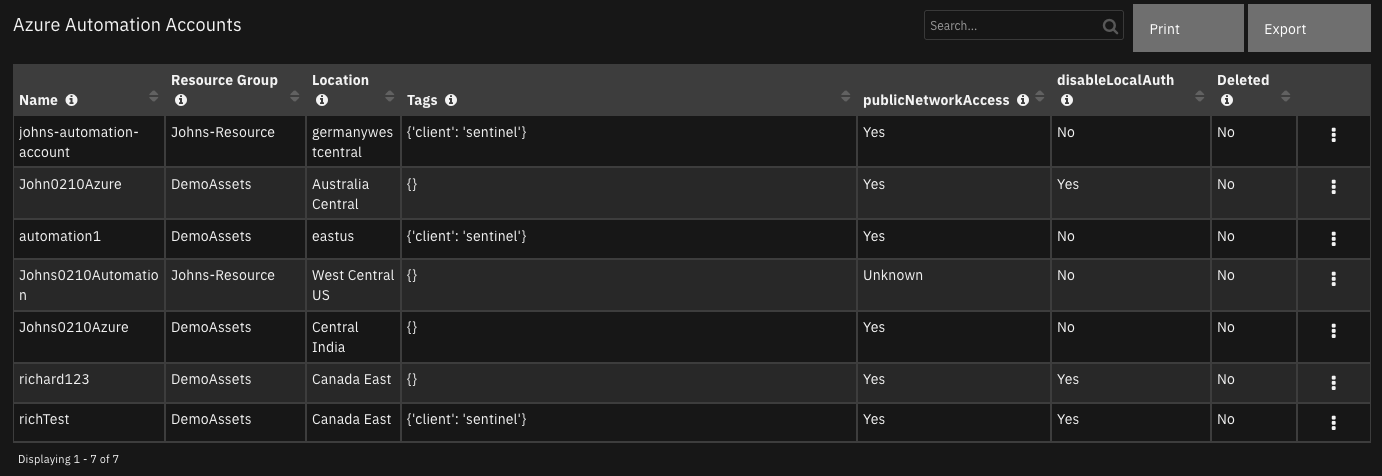
API Name:¶
azure_automation_accounts
Columns:¶
Column Name |
API Access Name |
Type |
Tooltip |
|---|---|---|---|
Deleted |
|
|
If the account has been deleted or not |
disableLocalAuth |
|
|
Either disable or enable local Auth. A value of True would mean local auth is disabled. |
Location |
|
|
The region the account is in |
Name |
|
|
Azure Automation Account Name |
publicNetworkAccess |
|
|
Either allow or deny access to public network from account |
Query Date |
|
|
Time the query to get this information was run |
Resource Group |
|
|
Azure Automation resource group name |
Tags |
|
|
dictionary of Azure automation account tags |
Data Table - Azure Automation Credentials¶

API Name:¶
azure_automation_credentials
Columns:¶
Column Name |
API Access Name |
Type |
Tooltip |
|---|---|---|---|
Account Name |
|
|
Name fo the account the credential is on |
Deleted |
|
|
If the credential is deleted |
Description |
|
|
Description for the credential |
Name |
|
|
Name of the credential |
Query Date |
|
|
Time the query was run to get this information |
Resource Group |
|
|
Resource group the credential is on |
Username |
|
|
Username for the credential |
Data Table - Azure Automation Runbooks¶
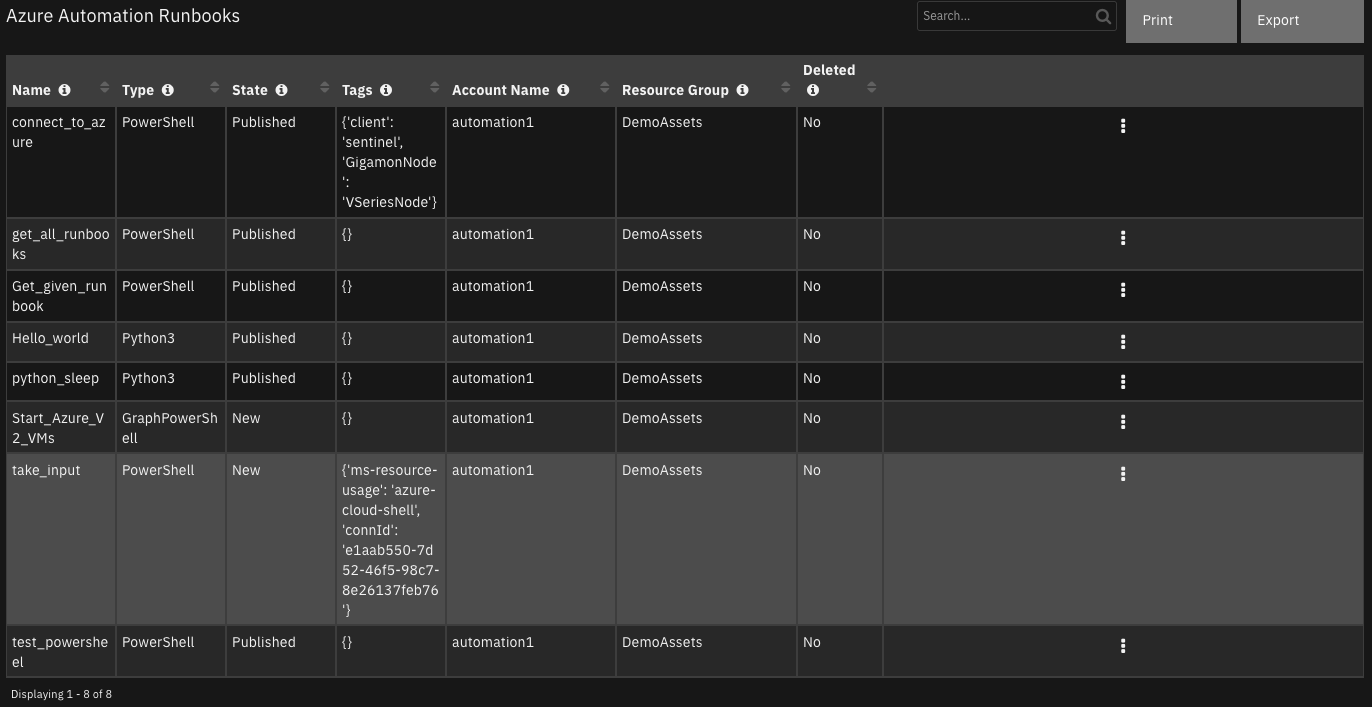
API Name:¶
azure_automation_runbooks
Columns:¶
Column Name |
API Access Name |
Type |
Tooltip |
|---|---|---|---|
Account Name |
|
|
Name of the account the runbook is on |
Deleted |
|
|
If the runbook as been deleted or not |
Name |
|
|
Name of the runbook |
Query Date |
|
|
Time the query to get this information was run |
Resource Group |
|
|
The resource group the account is on |
State |
|
|
State of the runbook |
Tags |
|
|
Tags given to the runbook |
Type |
|
|
Type of runbook |
Data Table - Azure Automation Schedules¶

API Name:¶
azure_automation_schedules
Columns:¶
Column Name |
API Access Name |
Type |
Tooltip |
|---|---|---|---|
Account Name |
|
|
Azure automation account name |
Advanced Schedule |
|
|
The advanced schedule properties |
Deleted |
|
|
If the schedule is deleted or not |
Description |
|
|
Description of the schedule |
Enabled |
|
|
Is the schedule enabled |
Expiry Time |
|
|
The time the schedule expires |
Frequency |
|
|
The frequency of the schedule |
Interval |
|
|
The execute intervals of the schedule |
Name |
|
|
Name of the schedule |
Query Date |
|
|
Time the query to get this information was run |
Resource Group |
|
|
Azure Automation resource group |
Start Time |
|
|
The time the schedule starts |
Time Zone |
|
|
The time zone the schedule is in |
Data Table - Azure Automation Statistics¶
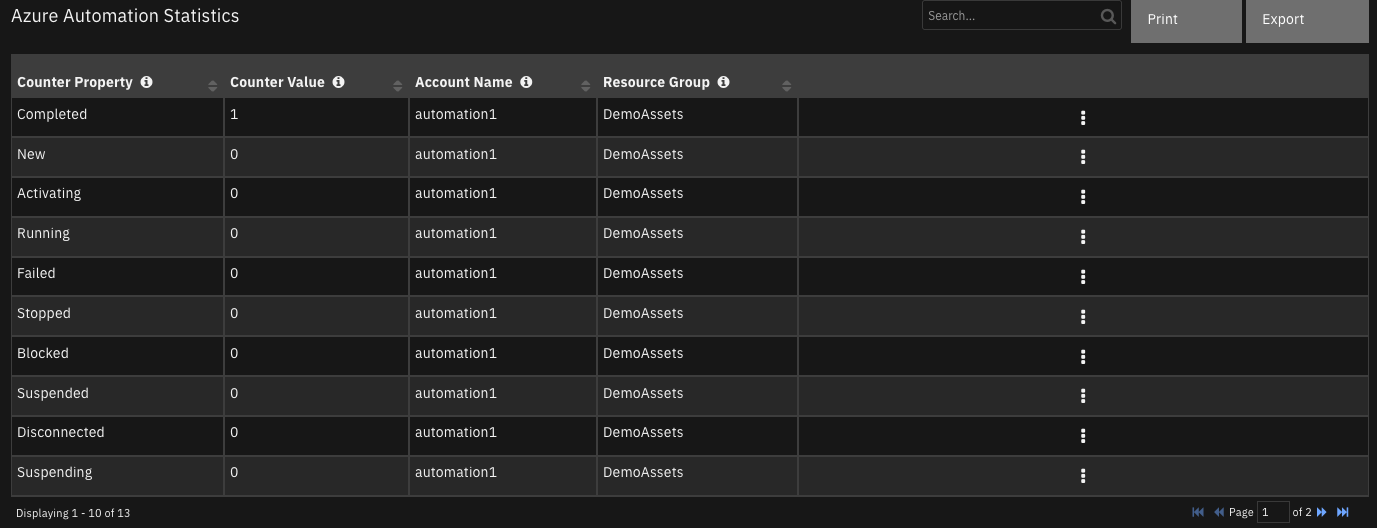
API Name:¶
azure_automation_statistics
Columns:¶
Column Name |
API Access Name |
Type |
Tooltip |
|---|---|---|---|
Account Name |
|
|
Azure Automation Account Name |
Counter Property |
|
|
Property of the counter statistic |
Counter Value |
|
|
The value of the counter statistic |
Query Date |
|
|
Time the query to get this information was run |
Resource Group |
|
|
Azure Automation resource group |
Custom Fields¶
Label |
API Access Name |
Type |
Prefix |
Placeholder |
Tooltip |
|---|---|---|---|---|---|
Create UI Tab |
|
|
|
- |
If true the Azure Automation UI Tab will be created |
Troubleshooting & Support¶
Refer to the documentation listed in the Requirements section for troubleshooting information.
For Support¶
This is an IBM supported app. Please search ibm.com/mysupport for assistance.